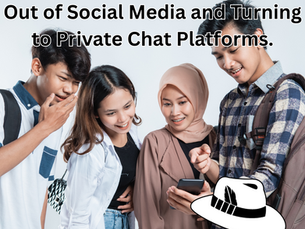top of page


When AI Feels Like a Friend: Why Teens Are Turning to Chatbots for Emotional Support
Teens are turning to AI chatbots like ChatGPT, Replika, and Character.ai not just for homework help, but as emotional confidants. To them, these tools feel like friends who listen without judgment. But while AI can sound caring, it cannot replace real human support. Parents and teachers need to know what this means for youth mental health.

The White Hatter
Aug 284 min read


When Educators Help Students Lead AI With Intention, They Don’t Cheat, They Grow! Some Thoughts For the 2025/2026 School Year
Every new technology in schools has sparked fear calculators, the internet, even laptops. Today, it’s AI. Parents and teachers worry: “Will it make students lazy? Will it replace authentic learning?” With the right guidance, AI won’t kill learning, it will reimagine it, and that shift needs to start now.

The White Hatter
Aug 253 min read


Preparing Youth for AI: Why Principles Matter More Than Platforms
AI headlines seem endless, new chatbots, image generators, and smart glasses arrive almost daily. For parents and teachers, it can feel like drinking from a firehose. The real challenge isn’t memorizing every tool but teaching kids timeless principles of safety, security, and privacy that prepare them for whatever comes next.

The White Hatter
Aug 234 min read


Intentionally Designed AI for Kids and youth: Messaging, Browsing, and Learning Made Safer
AI is becoming part of kids’ lives earlier than ever, but most platforms weren’t built with them in mind. A new wave of intentionally designed tools like Kinzoo + Kai for safe messaging, AngelQ for safer browsing, and Khanmigo for guided tutoring—put safety, creativity, and learning first. These platforms give kids a safer way to explore AI while keeping parents informed and involved.

The White Hatter
Aug 225 min read


When Teens Outsmart AI: Why Prompts Matter More Than Answers
Teens are learning how to bend AI guardrails with creative prompts, raising tough questions for parents and educators. The issue isn’t just what ChatGPT might say, but why a teen is asking in the first place. This article explores how prompts reveal deeper needs and how adults can respond with guidance, not fear.

The White Hatter
Aug 195 min read


“I.N.S.P.I.R.E. AI”: An Educational Program To Equip Youth & Teens To Use AI Safely, Responsibly, & With Purpose.
Artificial Intelligence has quickly moved from being a futuristic concept to a daily reality for today’s youth and teens. It shapes how youth and teens will learn, connect, and create. The challenge for parents and educators isn’t whether young people will use AI, but whether they’ll be equipped to use it thoughtfully, safely, and responsibly. That’s why we developed a new program for the 2025/2026 school year - “I.N.S.P.I.R.E. AI”.

The White Hatter
Aug 184 min read


Back to School Sleep: Why Parents & Caregivers Should Reset Routines Before the First Bell Rings
Imagine sending your child off to school feeling like they’ve just stepped off a red-eye flight, groggy, irritable, and struggling to focus. That’s what happens when summer sleep habits collide with the first week of school. The best way to prevent this “school-year jet lag” is to start resetting routines now.

The White Hatter
Aug 164 min read


TikTok “BOP Girls” and the Peer-to-Peer Recruitment Into Monetized Sexualized Online Lifestyles
A growing number of teens are being pulled into TikTok’s “BOP girl” culture, where hyper-sexualized self-presentation is sold as empowerment and fast money. What makes this trend especially dangerous isn’t just the algorithms pushing it—it’s the fact that recruitment often happens peer-to-peer. Friends, classmates, and near-age influencers frame it as normal, desirable, and profitable, making it harder for teens to recognize the risks until they’re already in too deep.

The White Hatter
Aug 154 min read


What Parents Need to Know About Instagram’s New Map Feature
Instagram's new Map feature lets users share their real-time location, see nearby friends, and discover posts based on geography. While it's off by default, parents should know how it works, talk to their teens about privacy settings, and set clear boundaries around location sharing and safety.

The White Hatter
Aug 82 min read


Teens Back Then vs. Teens Today: What’s Different, What’s The Same, and What The Data Shows.
A data-driven comparison of today’s teens and those from the 1970s–1990s challenges nostalgia. While modern youth face mental health concerns, they’re less likely to drop out, get pregnant, use drugs, or die in car crashes. Today’s risks are different, not worse. Facts over fear.

The White Hatter
Aug 67 min read


Book Review - Tech Smart Parenting: How to Keep Your Kids Happy & Safe Online"
Tech Smart Parenting” by Catherine Knibbs is the best book we’ve read in a long time on youth, digital literacy, and online safety. Backed by research and real-world experience, it offers clear, practical guidance and a refreshingly balanced approach for any parent or caregiver raising kids in a digital world.

The White Hatter
Aug 13 min read


Don’t Forget the Positives: How Youth Are Using Tech to Create Real & Positive Change
Despite headlines that focus on doom and addiction, many youth are using technology to lead, create, and make change. From activism to innovation, today’s teens are thriving online with empathy and purpose. It’s time we tell the whole story, not just the risks, but the remarkable opportunities too.

The White Hatter
Aug 12 min read


Why Youth & Teens Need Parents and Caregivers More Than Ever - Artificial Intelligence, Friction, Family, & Relationships
AI is changing how youth learn, connect, and grow, but with few rules and little oversight. This article urges parents, caregivers, and educators to step in. It highlights the risks of unregulated AI, the loss of healthy friction, and the need for thoughtful guidance and stronger regulation.

The White Hatter
Jul 309 min read


Are We Listening to the Right Voices? Rethinking the Narrative Around Youth and Tech
Many teens are thriving online, but adult fears often dominate the conversation. Rather than banning or delaying tech, we should guide youth with support, education, and trust. When we involve teens in decisions and model responsible use ourselves, they become more capable digital citizens.

The White Hatter
Jul 294 min read


How Socio-Economic Access Can Shape Youth Tech Use
Many youth spend hours on screens not because of poor parenting, but due to limited access to offline opportunities. Families with fewer resources often can't afford extracurriculars that compete with screen time. In these cases tech isn’t the enemy inequality and lack of alternatives are the real issues.

The White Hatter
Jul 284 min read


Why Teens Are Starting To Tune Out of Social Media and Turning to Private Chat Platforms.
Many teens are leaving public social media for private chats like Discord and iMessage, tired of AI-generated “slop” flooding their feeds. They want real connection, not content. This shift offers more control and authenticity but also raises new privacy and safety concerns for parents.

The White Hatter
Jul 267 min read


When Families Don’t Talk, Tech Will: Why Honest Conversations at Home Matter In The World Of Today’s ChatBots
When families avoid awkward conversations, emotionally responsive AI chatbots and apps are stepping in to fill the gap. This article urges parents to talk openly with their kids early and often, building trust and connection that no app can replace. Silence leaves room for tech to take over.

The White Hatter
Jul 253 min read


Teen Boys & Consent - We Need To Widen The Lens
Many consent talks focus on boys as boundary-pushers, not boundary-setters. This article challenges that view, urging us to teach teen boys that they too have the right to say no. True consent education must include boys as individuals with feelings, limits, and the right to be heard and respected.

The White Hatter
Jul 236 min read


UPDATE: Youth, Teens, and AI Companionship Apps
A new U.S. survey confirms what many youth experts have been seeing: nearly 3 in 4 teens have used AI companionship apps. These apps offer social, emotional, and even romantic interaction. While often used for fun, concerns include data privacy, emotional dependence, and replacing real-life support.

The White Hatter
Jul 184 min read


Is Social Media to Blame for Teen Overdose Deaths? A Retired Law Enforcement Perspective
This article explores whether social media is to blame for teen overdose deaths. Drawing from a retired officer's experience, it argues that while tech makes drug access easier, the root cause is the rise in fentanyl. It urges parents to stay informed, talk with teens, and advocate for platform accountability.

The White Hatter
Jul 175 min read
bottom of page
